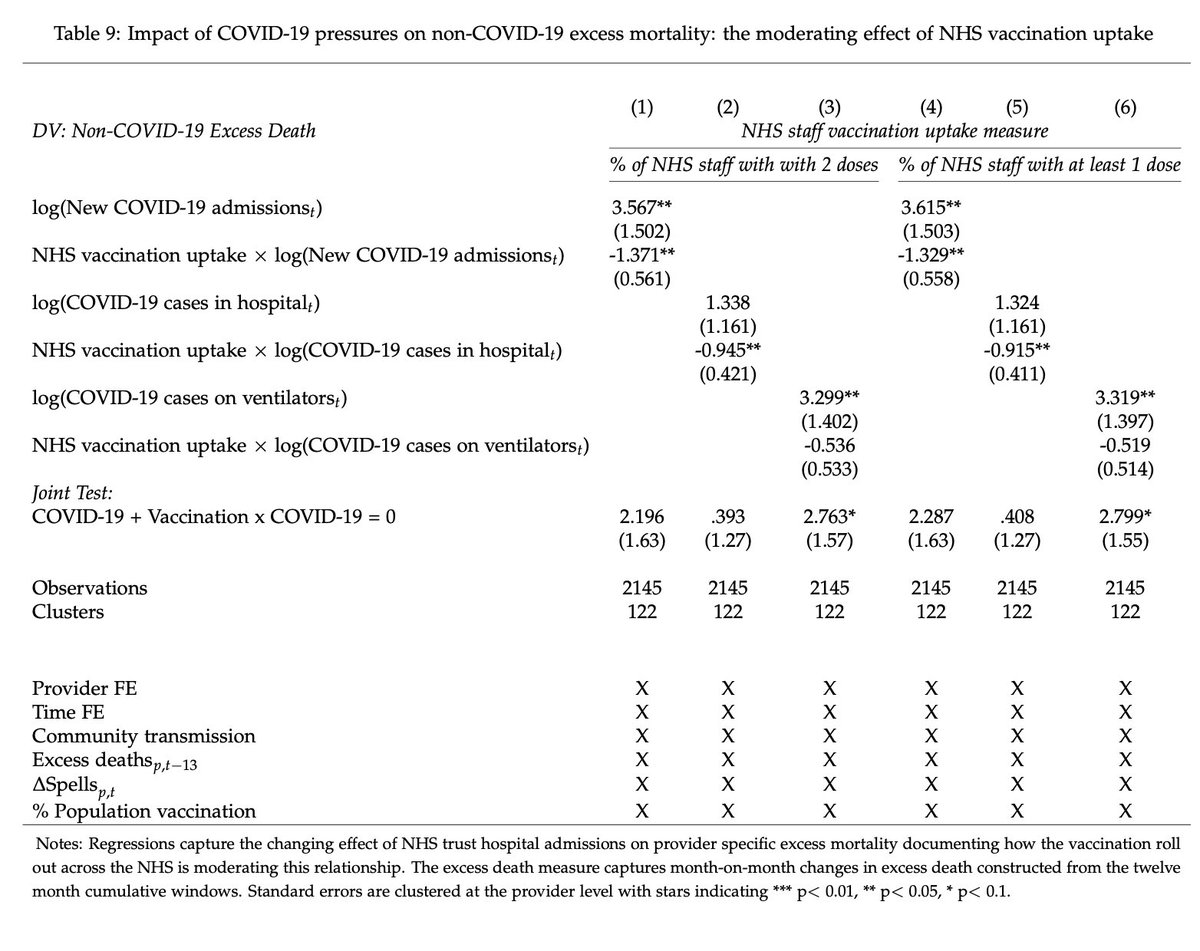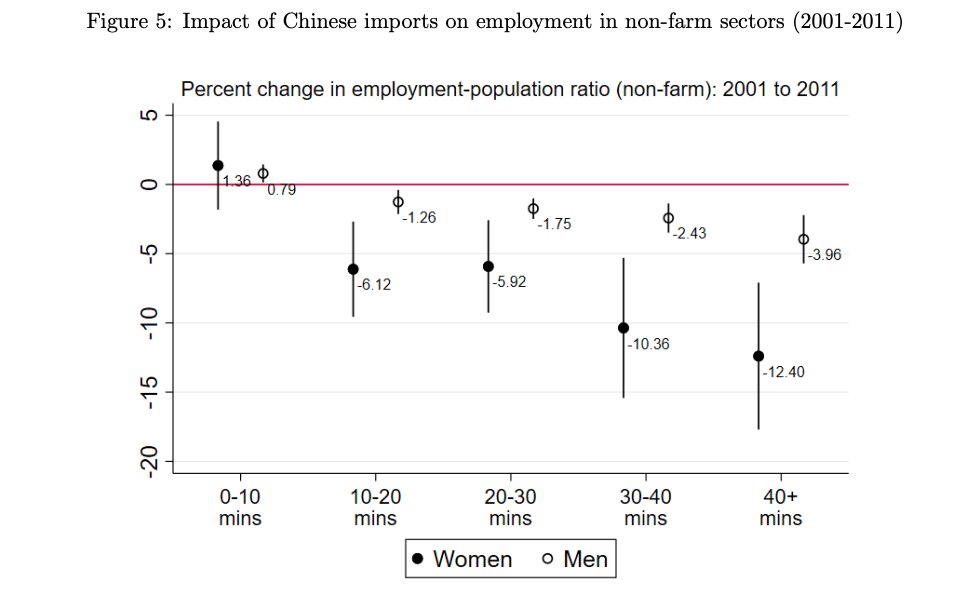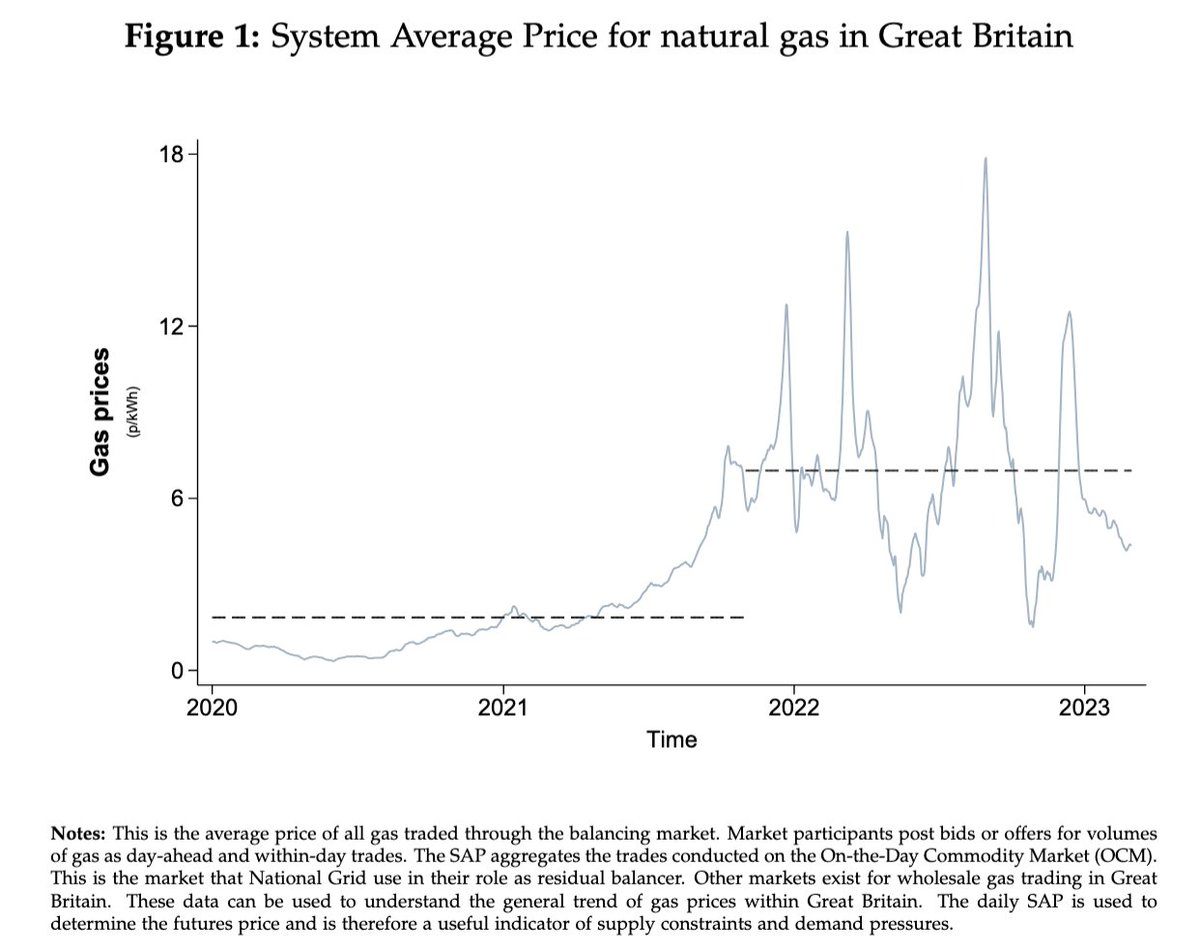Does #COVID19 crowd out care for non COVID patients in the #NHS? Has this led to a loss of lives? Are the numbers negligible? The short answers are: yes, yes & no!
Paper ➡️ bit.ly/33XMyHB & a long🧵on how we capture non COVID19 excess deaths & much more ⬇️ 1/n
Paper ➡️ bit.ly/33XMyHB & a long🧵on how we capture non COVID19 excess deaths & much more ⬇️ 1/n

Lets start with a headline result: we estimate that for every 30 #COVID deaths there is at least one avoidable non COVID excess death in 🏴 hospitals. To arrive at this we use cool #NHS data which makes for a great #EconTwitter #econometrics #DataScience teaching example. 2/n 

The #NHS has population individual level hospital episode data (HES) linked to death certificates. For each admitted patient, they predict P(Death|X). This is an out-of-sample prediction coming from Lasso logistic regression model trained on data from the last 3 years. 3/n 

The model considers individual variables such as age, mode of admission (ambulance, walk in etc.), pre-existing conditions, diagnosis, etc among others. The model does a good job at predicting out of sample accurately the # of deaths across NHS providers. At least until … 4/n 



…Mar 20 from then onwards there is structure in the implicit residuals with E[Observed - Expected(X)|X] >0 suggesting an omitted variable bias in the trained model. Cumulatively this is at least 4000 excess deaths from Mar 20 to Feb 21 alone. Now, you could be worried… 5/n 

…that this just captures COVID deaths. Thankfully the @NHSDigital removes ALL hospital episodes that have a #COVID19 diagnosis (which you get testing positive & note, all patients are routinely tested on admission & in hospital). Further, all deaths mentioning COVID19 on... 6/n 

the death certificate are removed. This is the most comprehensive measure of COVID19 deaths. So we genuinely capture conservatively the # of excess deaths among non COVID19 hospital episodes. The 4k relative to 120k gives you the 1 in 30 but could be as high a… in 25. Now,.. 7/n 

What is driving the variation in non #COVID19 excess deaths post Mar20? Surprise, surprise, pressures as e.g. measured by changes in provider-specific #COVID admissions appears an important omitted variable driving the variation. We can explore a bit what type of patient… 8/n 

… ends up being more likely to die under pandemic conditions? This data is not as nice (loads lot of suppression/low case counts… but it is basically a bunch of acute conditions. Most people can relate to "acute myocardial infarcrtion = heart attacks”.. so 9/n 

There is a non trivial and large increase in non COVID19 excess deaths among patients seeking help for non COVID19 reasons. You basically dont want to be having a heart attack in COVID times in an area with loads of COVID pressures. We could stop the paper here but,… 10/n
…we do MANY more exercises exploring in essence what is going on under the NHS' hood. Specifically, we look at the pandemic's effect on A&E care & waiting times; specialist referrals; diagnostic waits and… ; access & quality of cancer care…11/n 



We study patterns before & after the arrival of #COVID19 & across the recurring waves. For cancer care, the long run mortality impacts are most obvious: e.g. across #NHS patients with lower gastrointestinal cancer are now 20p.p. less likely to begin treatment within 62 days…12/n 

The ongoing #pandemic pressures keep cancer treatment delays up. We estimate there to be 32k missing cancer patients and more than 50k patients that had their treatment delayed by > 4 weeks which has mortality implications in the months and years to come. Now you could…13/n 

Think that this may all be due to lockdowns causing pent-up demand. There is a some of that but its important that on intensive margin the recurrent demand pressures due to COVID with COVID19 induced staff absence rates among patient facing staff is making things worse…but 14/n 

…the good news is that among providers with higher #Vaccination take-up, the non COVID19 excess mortality is weaker suggesting that #MandatoryVaccination may reduce this contributing factor to #NHS pressure. But best would be broad vaccination take up in community…15/n 

Lowering the #COVID19 pressures to begin with. The paper iI quite dense. The important message is that COVID19 care does crowd out non COVID care which prevents the NHS to provide its usual quality of care, producing notably worse outcomes for non COVID patients that... 16/n
could be avoided if there was broad vaccination take-up. I worry that recent NHS deals with private providers make the situation not notably better (see bit.ly/3IDSa9b) as private providers suck out more FTE/resources from the NHS while cream-skimming good risks...17/n
Meaning the govt in essence just transfers cash to private providers that further cannibalise the NHS without more output being produced as human capital is the constraining factor. Have a read and happy to get feedback on the paper ➡️ bit.ly/33XMyHB ENDS.
Of interest to? @COdendahl @AndreasShrugged @hmeyer78 @robfordmancs @CamEcon @janewayinst @Woessmann @ChadBown @EdConwaySky @EliasPapaioann2 @tabouchadi @jdportes @abicadams @cp_roth @LukasHenselEcon @whippletom @TeodoraBoneva1 @BenChu_ @ChrisGiles_ @ChadBown @Austinlwright
• • •
Missing some Tweet in this thread? You can try to
force a refresh


















